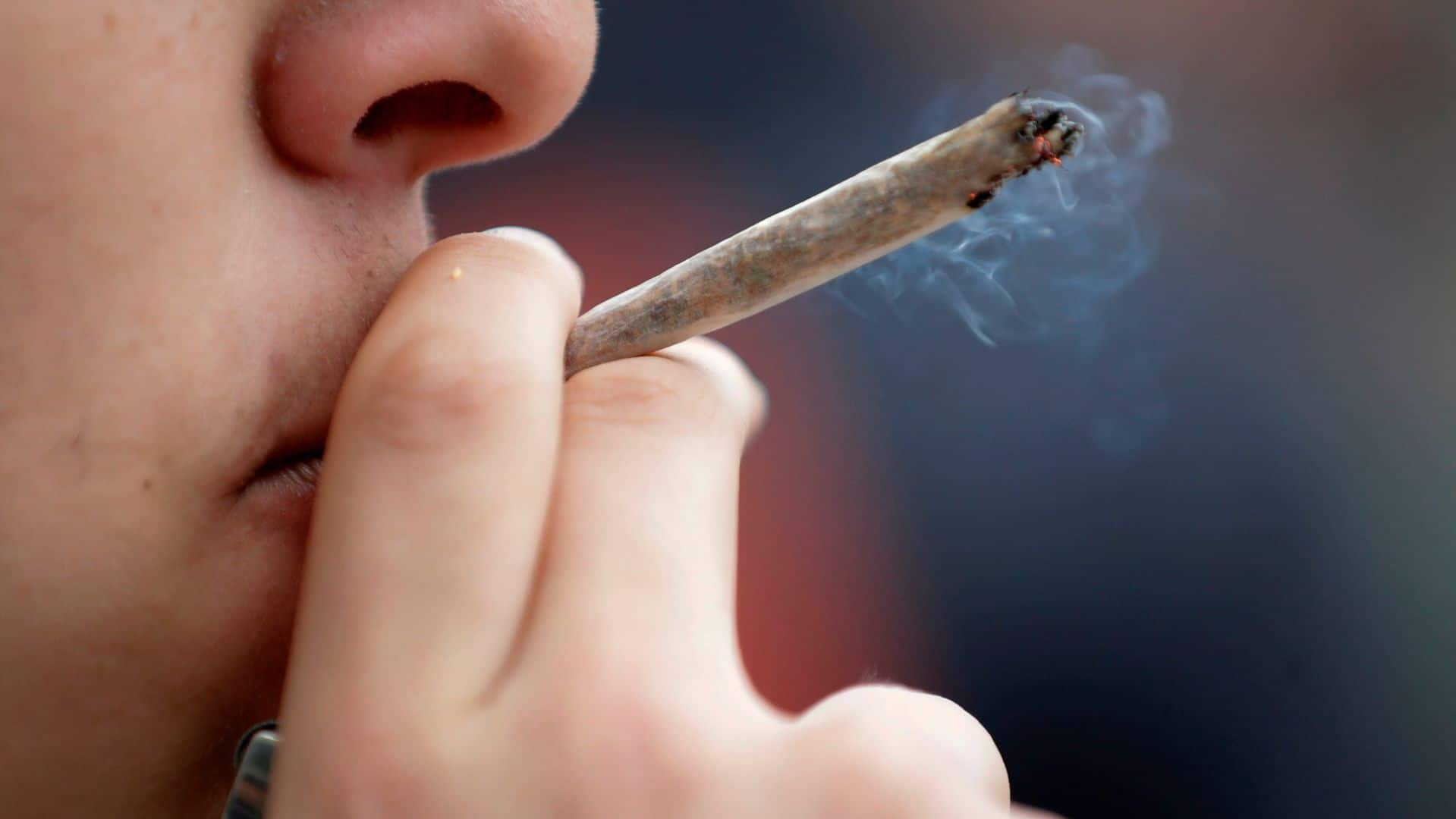ER visits in Ontario for cannabis-related psychosis rose 220% from 2014-21: study

When Kalpit Sharma started smoking cannabis, he thought it was just part of "living his life" as a university student. After all, he had been told that the drug was relatively harmless.
That all changed in the summer of 2021, when he started hearing voices in his head.
"I would bike around, and the chain of the bike, it came off. And I thought that I could speak to birds, and birds were telling me how to put the chain back on," said Sharma, who was studying at York University in Toronto at the time.
Those voices are known as auditory hallucinations — a hallmark of psychosis. When they became more frequent and insistent, he went to the Centre for Addiction and Mental Health for an assessment.
Sharma was shocked when he was told that he had been exhibiting signs of psychosis — and eventually he was diagnosed with schizophrenia.
"The ground slipped beneath my feet," he told White Coat, Black Art host Dr. Brian Goldman. "I'm going to be looked at differently. I'm going to be separated from society. I'm not going to be my parents' Kalpit ever again."
Sharma, who is now 23, said that after consulting with physicians, he believes his heavy smoking of high-THC cannabis contributed to his psychosis and schizophrenia. Now he urges consumers to educate themselves as increasingly potent cannabis products become commercially available in Canada.
Researchers are also sounding the alarm that, while casual cannabis use isn't harmful for most people, possible connections are being found between using cannabis products with high-potency THC (tetrahydrocannabinol, the main psychoactive ingredient in cannabis) and harmful health effects, particularly among young men.
"I think that people remain unaware of this connection between cannabis use and potential risk of chronic psychotic disorders," said Dr. Daniel Myran, a researcher with the Ottawa Hospital Research Institute and a family physician.
According to Health Canada's 2023 Cannabis Survey, 21 per cent of 16-to-19-year-olds who use cannabis use it daily or almost daily. In the 20-to-24-year-old group, that number goes up to 23 per cent.
In 2023, Myran co-authored two studies looking into the connection between cannabis and psychosis. They found a 220 per cent increase in emergency room visits in Ontario for cannabis-induced psychosis between 2014 and 2021 — with the number rising from about 400 people to about 1,400 over that seven-year period.
"For men aged 14 to 24, the risk of developing schizophrenia rises to over 40 per cent within three years" of showing up in an ER for cannabis-induced psychosis, he said.
Myran was also lead author of a separate study released in early February that found 27.5 per cent of people who visited an emergency room for cannabis use developed an anxiety disorder for the first time within three years.
Not your grandfather's weed
Starting in 2020, Sharma's cannabis consumption "skyrocketed" — when he and everyone else were inside because of pandemic lockdowns. But it was also shortly after more, and stronger, products became available in Ontario's cannabis shops.
"I was doing, let's say, half of a joint in 2018. That bumped up to, like, three or four joints in a day in 2020, 2021," he said.
In 2018, the same year the sale of cannabis became legal in Canada, licensed cannabis stores in Ontario could sell only dried flower, cannabis seeds and some oils, Myran said. In 2020, the number of stores allowed to open expanded, and newer products like gummies — some with much higher THC content — hit store shelves.
"The cannabis industry calls it cannabis 2.0. What these products are is just increasingly processed cannabis," Myran said.
Even without getting into edibles, nearly all cannabis today is much stronger than it was even a decade ago.
"It's been around for centuries. True enough. But the product that we're using today that's available to our youth and young adults into the population today is completely different than even what it was 10, 15 years ago," said Dr. Philip Tibbo, a professor and director of research in the department of psychiatry at Dalhousie University in Halifax.

Naturally occurring cannabis plants contain one to two per cent THC; genetically modified plants are cultivated to boost the percentage. From the 1960s to the '80s, you might encounter cannabis with anywhere from one to five per cent THC.
Today, the amount in plants is much higher, and commercially available processed products can contain 20 per cent THC or more.
Those higher-THC products enticed Sharma as he smoked more products to chase higher highs. He was also drawn to products with humorous names, like a strain called Black Widow, since it reminded him of the Marvel character.
After his diagnosis, Sharma initially tried cognitive behavioural therapy, but he declined an anti-psychotic medication, Abilify, recommended by doctors out of fear of the stigma.
Soon after he had his worst psychotic episode, at a family wedding in India.
"I didn't follow through with it, but I was close to self-harm," he said.

Cannabis use and hospitalizations up 5 years after legalization, researchers say
4 months ago
The number of Canadians using cannabis has increased by 25 per cent since it was legalized five years ago, a new commentary in the Canadian Medical Association Journal stated. But hospitalizations are also on the rise, prompting some doctors to say more information and better policies are needed to better mitigate negative outcomes.
When cannabis was first legalized, some labels on packages included warnings that regular use "can increase the risk of psychosis and schizophrenia." They were phased out in April 2019.
Health Canada told CBC News that the labels were changed to "refresh messaging to make it more reflective of population-level guidance," and included consultations with scientific experts and the public.
Health Canada does have warnings online to "avoid cannabis completely" if you're at risk of psychosis or schizophrenia.
Ottawa researcher Myran said it was a mistake to do so and that those warnings should be put back. "I think Canadians have a right to know about this association, about this link," he said.
What to know about high-THC cannabis
Today, Sharma is working on managing his psychosis with therapy, medication — and laughter, when he performs onstage as a standup comedian.
"I was confused what to do with my life. So people told me to listen to my inner voice. And now I have schizophrenia," he begins his routine.
He's also working as a strategic adviser for the Cannabis and Psychosis Project, an online resource created by the Schizophrenia Society of Canada.
Sharma said he hopes his story can encourage people to take the time to research cannabis instead of lighting up and possibly putting themselves at risk — and to always start with something with a low amount of THC.
Like any other product, Dalhousie University's Tibbo said, it's always better to be an informed consumer.
He said it's important to understand that today's cannabis products are often stronger and act differently than a joint passed around in a basement in the '70s.
Edibles take longer to kick in, for example. So if people want an immediate high, they risk eating too many too fast and getting hit harder.
If you're the parent of a youth who's thinking of trying cannabis for the first time, it's also important to know how to broach the topic, Tibbo said.
"Although difficult for parents, sometimes, [you should] be able to know how to ask those questions in kind of a non-judgmental way that will allow you to have a conversation with your child — versus that child, you know, kind of putting up the wall and not having that conversation."
Interviews produced by Jennifer Warren and Sameer Chhabra

Add some “good” to your morning and evening.
A vital dose of the week's news in health and medicine, from CBC Health. Delivered to your inbox every Saturday morning.
The next issue of CBC Health's Second Opinion will soon be in your inbox.
Discover all CBC newsletters in the Subscription Centre.
*****
Credit belongs to : www.cbc.ca
 MaharlikaNews | Canada Leading Online Filipino Newspaper Portal The No. 1 most engaged information website for Filipino – Canadian in Canada. MaharlikaNews.com received almost a quarter a million visitors in 2020.
MaharlikaNews | Canada Leading Online Filipino Newspaper Portal The No. 1 most engaged information website for Filipino – Canadian in Canada. MaharlikaNews.com received almost a quarter a million visitors in 2020.







